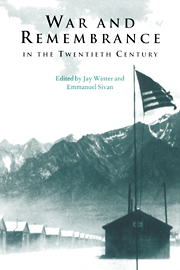Book contents
- Frontmatter
- Contents
- Preface
- Introduction
- 1 Setting the framework
- 2 Forms of kinship and remembrance in the aftermath of the Great War
- 3 War, death, and remembrance in Soviet Russia
- 4 Agents of memory: Spanish Civil War veterans and disabled soldiers
- 5 Children as war victims in postwar European cinema
- 6 From survivor to witness: voices from the Shoah
- 7 Landscapes of loss and remembrance: the case of Little Tokyo in Los Angeles
- 8 The Algerian War in French collective memory
- 9 Private pain and public remembrance in Israel
- 10 Personal narratives and commemoration
- 11 Against consolation: Walter Benjamin and the refusal to mourn
- Index
- Studies in the Social and Cultural History of Modern Warfare
1 - Setting the framework
Published online by Cambridge University Press: 27 October 2009
- Frontmatter
- Contents
- Preface
- Introduction
- 1 Setting the framework
- 2 Forms of kinship and remembrance in the aftermath of the Great War
- 3 War, death, and remembrance in Soviet Russia
- 4 Agents of memory: Spanish Civil War veterans and disabled soldiers
- 5 Children as war victims in postwar European cinema
- 6 From survivor to witness: voices from the Shoah
- 7 Landscapes of loss and remembrance: the case of Little Tokyo in Los Angeles
- 8 The Algerian War in French collective memory
- 9 Private pain and public remembrance in Israel
- 10 Personal narratives and commemoration
- 11 Against consolation: Walter Benjamin and the refusal to mourn
- Index
- Studies in the Social and Cultural History of Modern Warfare
Summary
Collective remembrance
Collective remembrance is public recollection. It is the act of gathering bits and pieces of the past, and joining them together in public. The ‘public’ is the group that produces, expresses, and consumes it. What they create is not a cluster of individual memories; the whole is greater than the sum of the parts. Collective memory is constructed through the action of groups and individuals in the light of day. Passive memory – understood as the personal recollections of a silent individual – is not collective memory, though the way we talk about our own memories is socially bounded. When people enter the public domain, and comment about the past – their own personal past, their family past, their national past, and so on – they bring with them images and gestures derived from their broader social experience. As Maurice Halbwachs put it, their memory is ‘socially framed’. When people come together to remember, they enter a domain beyond that of individual memory.
The upheavals of this century have tended to separate individual memories from politically and socially sanctioned official versions of the past. All political leaders massage the past for their own benefit, but over the last ninety years many of those in power have done more: they have massacred it. Milan Kundera tells the story of a photograph of the political leadership of the Czech socialist republic in 1948. One man in the photo was later purged.
- Type
- Chapter
- Information
- War and Remembrance in the Twentieth Century , pp. 6 - 39Publisher: Cambridge University PressPrint publication year: 1999
- 73
- Cited by



